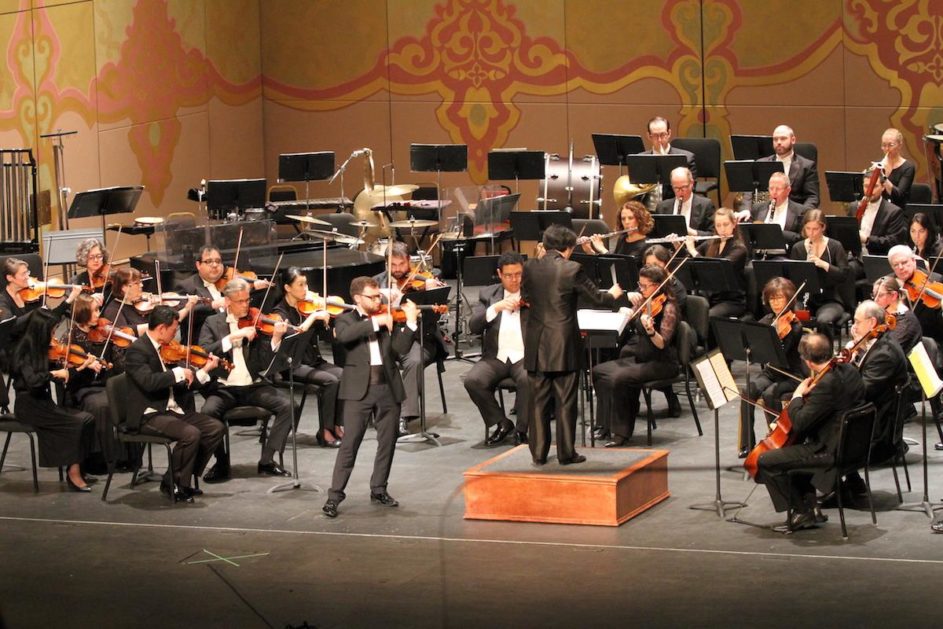When Knoxville Symphony concertmaster William Shaub walked on stage at the Tennessee Theatre Thursday night to play Felix Mendelssohn’s 1844 “Violin Concerto in E Minor,” Op. 64, he was continuing the tradition set by Mendelssohn himself.
While Mendelssohn was conductor of the Gewandhaus Orchestra in Leipzig, he wrote the concerto for his own concertmaster, Ferdinand David. It’s generally accepted that David had a significant hand in getting the composition to its final shape, including essentially creating the gorgeous first-movement cadenza himself.

Violinist William Shaub steps into a phrase during Mendelssohn’s concerto.
After hearing Shaub play the concerto last night, with guest conductor Mei-Ann Chen on the podium, I imagine that both Mendelssohn and David would have been proud of his virtuoso performance.
Shaub plays with passion. He often leans into a phrase, sometimes steps into an important moment or leans away to let a gossamer high note float into space. But he never engages in theatrics that upstage the music.
His lovely first-movement cadenza, fully written out by Mendelssohn/David, was as much musical poetry in its execution as it was virtuosic fireworks.
Shaub is a musician’s musician. He showcases himself by showcasing the music, not the other way around.
Chen opened the concert with Aaron Jay Kernis’ 1996 showcase for orchestra “Too Hot Toccata,” written as a celebration of the musicians of the St. Paul Chamber Orchestra, where Kernis was composer in residence.
In Kernis’ typical style, he splashed the sound all over the orchestra. There were energized percussion moments and a tangled honkytonk piano solo – described by Kernis as horribly difficult, but dashed off by principal pianist Emi Kagawa as though it were only a casual warmup.

Violinist William Shaub and conductor Mei-Ann Chen at the standing ovation for their performance of Mendelssohn’s “Violin Concerto in E Minor”
There was also what Kernis described as a fiendish clarinet solo that principal clarinet Gary Sperl handled with ease. Principal trumpet Phillip Chase Hawkins also had some sparkling moments with his piccolo trumpet, the high-pitched voice that doesn’t get heard in the orchestra very often.
The second half of the concert began with William Walton’s suite of arrangements of nine selections of J.S. Bach’s music, written for Walton’s ballet score for “The Wise Virgins, based on the Biblical parable in the book of Matthew about the Wise and Foolish Virgins.
The original, full score has been lost, but Walton’s suite for orchestra, utilizing six of the nine selections, survives.
With careful listening, one can hear Bach inside the often-grand orchestral sound, especially in the opening “What God hath done, is rightly done.” The second section, “Lord, hear my longing,” and third, “See what His love can do,” had more meditative qualities through which Bach’s music was more easily heard. They featured lovely flute and oboe solos by principal flute Hannah Hammel, principal oboe Claire Chenette. Associate concertmaster Gordon Tsai played a gorgeous solo in the fifth section, “Sheep may safely graze.”
More music originally intended for ballet closed the concert with Paul Hindemith’s “Symphonic Metamorphosis on Themes of Carl Maria von Weber,” written in 1943. The music was originally composed for a ballet that utilized von Weber’s music. But the impresario, Léonide Massine, intended to use costumes and sets designed by Salvador Dali.
Hindemith hated Dali’s work so much he refused to have his music associated with it, withdrawing from the project and later reworking the music for orchestra alone.
Although there were moments of brilliance for many of the musicians in the orchestra, this music was Chen’s opportunity to shine. Her command of Hindemith’s multiple thought patterns and the layers of movement of sound around the orchestra were impressive indeed as she conducted completely from memory.
This concert will be performed again at 7:30 tonight at the Tennessee Theatre. Plenty of time should be allowed for parking and getting through security screening. For tickets and more information about the concert call the KSO ticket office at 865-291-3310, or visit the website.

